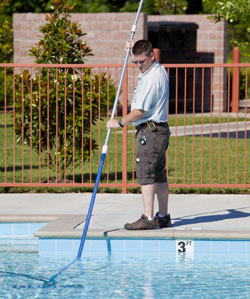
How Do I Treat The Water In My Swimming Pool?
Testing and treating are what you need to do to make sure the water in the swimming pool is fine for swimming. It's necessary to watch the pH of the water very carefully to ensure that those who swim in your pool will not get irritations of the skin or eyes. It's important that the water in your swimming pool be alkaline, meaning a pH level of 7.5 or more. The pH level should at least be a neutral 7.0 or else it will be too acidic if it falls below that. Swimming in water that is too acidic can mean that the eyes and skin get red and irritated. If your pH level is too low, it can cause structural damage to your pool such as erosion of the grout, cement and plaster. It can also damage your pipes and filtration equipment.
However, that isn't to say that you should keep the pH level very high. Here are some of the problems caused by a high level of alkalinity in pool water: 1/ Damage to pool equipment such as pumps, pipes and filters. 2/ A film of calcium carbonate chemicals will build up on the walls and floor of the pool. Damage to pool equipment could restrict the flow of water and make the filter less effective. Generally speaking, you should maintain the pH level in the swimming pool at somewhere between 7.2 - 7.6. It's necessary to keep the pool's pH level stabilized in order to keep these negative effects from occurring.
An additional way to keep the correct water quality of the swimming pool is by using a sterilizer. Exercise special care in the summertime or if you live where the weather is mild all year. If the water in the pool is too warm, dangerous bacteria might breed, along with algae and all sorts of different organisms. Some of the contaminants introduced to the pool water by swimmers are: urine, bacteria, dirt, germs, body oils, dead skin cells, and other things. These contaminants will make the water cloudy and give it a strange color, taste, and smell.
Chlorine, bromine, or peroxide are chemicals you can use to keep your swimming pool clean. Chemicals like these will kill off the organisms and destroy them to make sure that the pool isn't harboring dead organisms. A sanitizer will work with the pH level to make sure the pool is sufficiently safe to go swimming in. Sanitation won't work if the pool water hasn't been balanced correctly because the sanitization and balance must work together.
Remember that taking care of water treatments for your pool will cost you at least two hours of your time weekly. This is especially true at times when the swim season is at its height. Keeping your pool clean involves a number of regular chores such as keeping the skimmer baskets and pump strainer clean, skimming debris out of the pool, and vacuuming the pool. Naturally, if your pool area is within a screened enclosure, you won't have to do too much of this. Even though you may decide it's better to have your pool maintained by professionals, it's a good idea to understand the process so that you will know if it is being done well or not.
Sadly, there isn't just one way to keep a swimming pool clean. Pools vary and each may use a different set of equipment and chemicals to keep the water clean. The most widespread methods are not too labor-intensive and they are quite simple to conduct. They do require a bit of an investment of time. Here are the water quality elements that must be considered for proper pool treatment: bacteria accumulation, algae accumulation, dissolved mineral concentration, acidity, softness, hardness. Other factors have to do with the frequency at which your pool is used, how much sun it gets, the kind of chemicals that are used, the pollution that's around, and the temperature of the water and air. By making sure your swimmers are clean, you can also make sure your pool water is clean. The amount of work you must devote to maintenance and the cleanliness of your pool are dependent, in part, on the amount of time your filtration system is kept in operation.
You will begin to develop a routine for treating your own pool. Take care to conduct an assessment of pH balance and contamination to be sure your actions are effective. Hiring a reputable pool cleaning company can take the burden of responsibility for the health of your swimmers off your shoulders.
Tip: Maintaining proper pool chemistry is vital to the health of your pool and its swimmers. If you don't want to maintain your pool's chemicals yourself, contact a Houston pool cleaner today.

